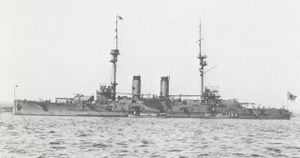Japanese battleship Kashima

Kashima at anchor
|
|
| History | |
|---|---|
|
|
|
| Name: | Kashima |
| Namesake: | Kashima Shrine |
| Ordered: | 1904 |
| Builder: | Armstrong Whitworth, Elswick |
| Yard number: | 755 |
| Laid down: | 29 February 1904 |
| Launched: | 22 March 1905 |
| Completed: | 23 May 1906 |
| Out of service: | April 1922 |
| Struck: | 20 September 1923 |
| Fate: | Scrapped, 1924 |
| General characteristics | |
| Class and type: | Katori-class semi-dreadnought battleship |
| Displacement: | 16,400 long tons (16,700 t) (normal) |
| Length: | 473 ft 7 in (144.3 m) |
| Beam: | 78 ft 2 in (23.8 m) |
| Draught: | 26 ft 4 in (8.0 m) |
| Installed power: |
|
| Propulsion: | 2 shafts, 2 Vertical triple-expansion steam engines |
| Speed: | 18 knots (33 km/h; 21 mph) |
| Range: | 12,000 nmi (22,000 km; 14,000 mi) at 11 knots (20 km/h; 13 mph) |
| Complement: | 864 |
| Armament: |
|
| Armour: |
|
Kashima (鹿島 (戦艦)? Kashima (senkan)) was the second ship of the two Katori-class pre-dreadnought battleships built for the Imperial Japanese Navy (IJN) in the first decade of the 20th century, the last to be built by British shipyards. Ordered just before the start of the Russo-Japanese War of 1904–05, the ship was completed a year after its end. She saw no combat during World War I, although the ship was present when Japan joined the Siberian Intervention in 1918. Kashima was disarmed and scrapped in 1923–24 in accordance with the terms of the Washington Naval Treaty of 1922.
The Katori-class ships were ordered just before the start of the Russo-Japanese War in 1904 as improved versions of the Royal Navy’s King Edward VII-class battleships.Kashima was 473 feet 7 inches (144.3 m) long overall and had a beam of 78 feet 2 inches (23.8 m). She had a full-load draught of 26 feet 4 inches (8.0 m) and normally displaced 16,400 long tons (16,700 t) and had a crew of 864 officers and enlisted men. The ship was powered by two vertical triple-expansion steam engines using steam generated by 20 Niclausse boilers. The engines were rated at 15,800 indicated horsepower (11,800 kW), using forced draught, and were designed to reach a top speed of 18.5 knots (34.3 km/h; 21.3 mph). Kashima, however, reached a top speed of 19.24 knots (35.63 km/h; 22.14 mph) from 17,280 indicated horsepower (12,890 kW) on her sea trials on 4 April 1906. She carried a maximum of 2,200 long tons (2,200 t) of coal and 750 long tons (760 t) of fuel oil which was sprayed on the coal to increase their power. This allowed her to steam for 12,000 nautical miles (22,000 km; 14,000 mi) at a speed of 11 knots (20 km/h; 13 mph).
...
Wikipedia
